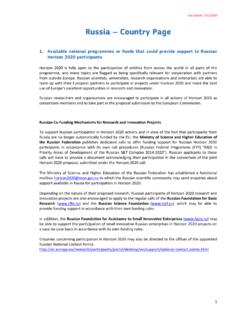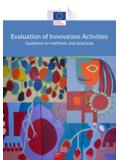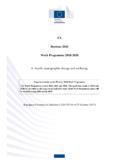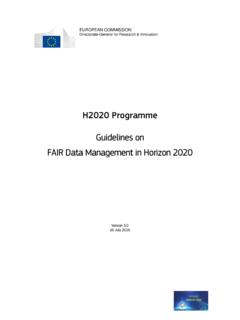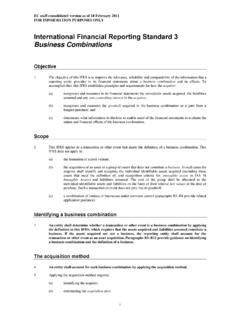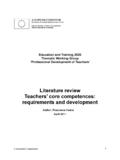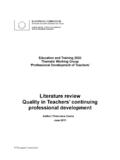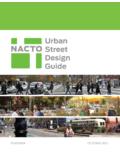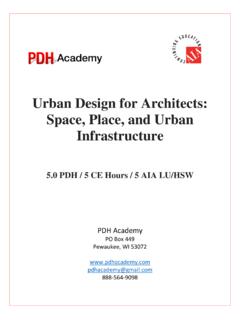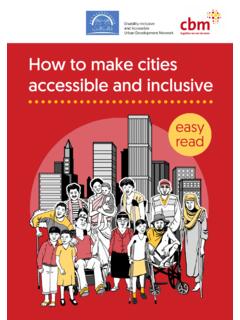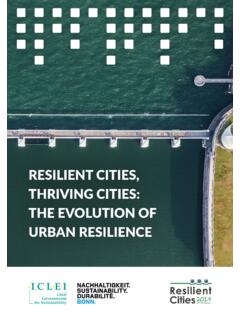Transcription of Frequently Asked Questions
1 Frequently Asked Questions Latest update: 25 November 2021 This document provides answers to Questions that were raised by participants of the webinar The Climate-Neutral and Smart cities Mission on 1 October 2021, in subsequent events and in correspondence with the cities Mission Secretariat. It is a living document that will be updated with more Questions and answers over time. The recording of the webinar and the PowerPoint presentations are available at: This is an internal working document of the European Commission.
2 It is made public for information only and does not bind the European Commission. The European Commission is not liable for any consequence stemming from the reuse of this document. Questions & ANSWERS THE ROLE OF NATIONAL AUTHORITIES Group Q&A General 1. How are national authorities expected to take part in the initiative? What will be the role of the state level? Will they participate with funds and enable access to other funding? National authorities have an essential role in the cities Mission: they will need to be involved in the co-creation and implementation of the Climate City Contracts (CCCs) and the development of related investment plans, in close collaboration with the Mission Platform.
3 A network of national contacts is going to be established and will be supported to prepare for the transition of cities to climate neutrality in their respective countries. Particular tasks of the network will be to involve national funding programmes and to make sure that the national regulatory framework enables cities to take the necessary steps to become climate-neutral. The Mission also foresees the creation of a Mission label (assigned at the signature of the CCC) that would recognize the quality and feasibility of the commitments taken by the city and unlock additional financial opportunities at the European and national levels.
4 2. Will the national level be involved in choosing the first cities ? While Member States will be closely involved in the implementation of the cities Mission, the decision on the selection of the cities that will be part of the Mission will be made by the European Commission, based on an assessment of cities expressions of interest by independent external experts. Citizens engagement 3. Should cities involve stakeholders and citizens already at the stage of Expression of Interest? At the Expression of Interest stage, cities will be Asked to indicate how they are already engaging citizens and stakeholders and what their future plans are in this respect.
5 As the deadline for submitting an Expression of Interest will be relatively short, there may not be enough time to consult stakeholders and citizens at this stage. However, if a city is ready and able to do this, it would be welcome to do so. ENGAGEMENT OF DIFFERENT ACTORS Collaboration with other bodies and programmes 4. How will be the EIT KIC Urban Mobility be involved or at least taken into account into the Mission-Concept? The EIT KIC Urban Mobility is a partner in the NetZeroCities consortium and will participate in the initial set-up of the Mission Platform.
6 In general, synergies and collaboration with relevant EIT Knowledge and Innovation Communities are welcomed and encouraged in the context of the projects supported through the Horizon Europe Missions Work Programme. 5. Are cities expected to participate by themselves, or is the support of local industry, research centers, and academia in consortia foreseen? The Call for Expression of Interest is addressed to cities and a consortium is not required for this purpose. However, we very much hope and expect cities to draw upon support from all sorts of external actors in the following phases, especially during the preparation and the subsequent implementation of the Climate City Contracts or if participating in calls under the Horizon Europe Missions Work Programme.
7 6. How is the Mission disseminated through national agencies, ministries, As a university representative wanting to engage our own city, we may need some additional traction. Member States representatives from Research Ministries and National Agencies are part of the Horizon Europe Strategic Programme Committee that is consulted during the preparation and implementation of the Mission's Research and Innovation Work Programme and calls. In addition, knowledge and know-how will also be spread through dedicated national networks supporting Missions.
8 This will include support to a network of national contacts, a cooperation and coordination network between EU-level actors and complementary national, regional, and local actors to set the basis for a solid governance of the Mission at the national and regional level. 7. How do you see the contribution of Living Labs and Incubators? The notion of living labs relates to inclusive platforms enabling a range of stakeholders ( , urban actors, authorities, companies, research institutions, societal actors, and citizens) to engage in inclusive, collaborative processes.
9 They have been shown to help to identify needs and challenges from diverse stakeholders and citizens perspectives and at different levels ( , neighbourhood, district, city, regional, etc.), co- design and co-create the solutions/approaches, implement, experiment, and test them in real-life settings and evaluate and assess their impact. These innovations can help the cities to develop better climate neutrality solutions drawing on digitalization for instance. The Horizon Europe Mission Work programme will provide opportunities to support this type of initiatives.
10 R&I entities 8. As an R&I entity, how can we be engaged in this mission: by contacting cities and offering services? R&I entities can participate in project proposals and consortia under the Horizon Europe Missions Work programme calls, together with cities , following the normal Rules for Participation in Horizon Europe calls. They are also encouraged to make contact with cities and develop ideas for cooperation. NGOs 9. What role, if any, can NGOs active in cities play in encouraging cities to join?
